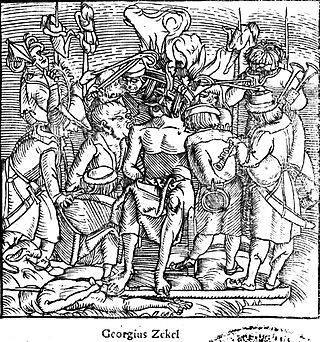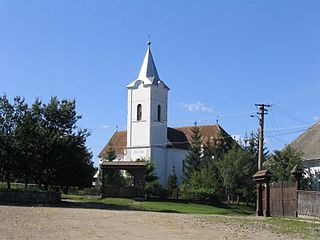The Old Hungarian script or Hungarian runes is an alphabetic writing system used for writing the Hungarian language. Modern Hungarian is written using the Latin-based Hungarian alphabet. The term "old" refers to the historical priority of the script compared with the Latin-based one. The Old Hungarian script is a child system of the Old Turkic alphabet.

The Székelys, also referred to as Szeklers, are a Hungarian subgroup living mostly in the Székely Land in Romania. In addition to their native villages in Suceava County in Bukovina, a significant population descending from the Székelys of Bukovina currently lives in Tolna and Baranya counties in Hungary and certain districts of Vojvodina, Serbia.

György Dózsa was a Székely man-at-arms from Transylvania, Kingdom of Hungary who led a peasants' revolt against the kingdom's landed nobility during the reign of King Vladislaus II of Hungary. The rebellion was suppressed, and Dózsa captured, tortured, and executed by being seated on a throne, crowned with red-hot iron, devoured alive by his followers under duress, and then quartered.

Târgu Secuiesc is a city in Covasna County, Transylvania, Romania. It administers one village, Lunga (Nyújtód).

Gheorgheni is a city in Harghita County, Romania, with a population of 15,844, as of 2021. It lies in the Székely Land, an ethno-cultural region in eastern Transylvania. The city administers four villages: Covacipeter (Kovácspéter), Lacu Roșu (Gyilkostó), Vargatac (Vargatag), and Visafolio (Visszafolyó).
Tamás Märcz is a Hungarian water polo player who played on the gold medal squad at the 2000 Summer Olympics. He was the head coach of Hungary men's national water polo team between 1 January 2017 and 18 July 2022.

The Hungary national handball team is administered by the Hungarian Handball Federation.

Tomești is a commune in Harghita County, Romania. It lies in the Székely Land, an ethno-cultural region in eastern Transylvania. It is named after Saint Thomas. The commune is composed of a single village, Tomești.
Áron Tamási was a Hungarian writer. He became well known in his native region of Transylvania and in Hungary for his stories written in his original Székely style.
The Left Front – Communist Youth Alliance is the inactive youth organization of the Hungarian Workers' Party, founded in 1999, as the successor of the Marxist Youth Alliance. Its first name was Left Front - Workers Youth Alliance. The Baloldali Front has been a member of World Federation of Democratic Youth since 2004.

Dalnic is a commune in Covasna County, Transylvania, Romania. Composed of a single village, Dalnic, it became an independent commune when it split from Moacșa in 2004.

Dornești is a commune located in Suceava County, in the historical region of Bukovina, northeastern Romania. It is composed of two villages, Dornești and Iaz. From 1786 to 1941, the village of Dornești was inhabited by the Székelys of Bukovina. In the past, the commune was also inhabited by a German minority, more specifically Bukovina Germans. Nowadays, the vast majority of the population are ethnic Romanians.

Pestszentlőrinc-Elektromos-Rév Kézilabda Club was a Hungarian team handball club from Pestszentlőrinc, Budapest, that played in the Nemzeti Bajnokság I, the top level championship in Hungary.
The Alsószentmihály inscription is an inscription on a building stone in Mihai Viteazu, Cluj. The origins and translation of the inscription are uncertain.
The Szarvas inscription refers to the inscription on a bone needle case found near Szarvas in southeastern Hungary and dating from the second half of the 8th century, the "Late Avar" period (700-791).
Scholarly theories about the origin of the Székelys can be divided into four main groups. Medieval chronicles unanimously stated that the Székelys were descended from the Huns and settled in the Carpathian Basin centuries before the Hungarians conquered the territory in the late 9th century. This theory is refuted by most modern specialists. According to a widely accepted modern hypothesis, the Székelys were originally a Turkic people who joined the Magyars in the Pontic steppes. Another well-known theory states that the Székelys are simply Magyars, descended from the border guards of the Kingdom of Hungary who settled in the easternmost region of the Carpathian Basin and preserved their special privileges for centuries. According to a fourth theory, the Székelys' origin can be traced back to the Late Avar population of the Carpathian Basin.
Tamás Székely was a Hungarian alpine skier. He competed in three events at the 1948 Winter Olympics.
Nándor Károly Tamás is a Romanian professional footballer who plays as a forward for Slovak First Football League club Komárno.

Tamás Székely is a Hungarian evolutionary biologist and conservationist. He is the Professor of Biodiversity at the University of Bath and he holds an Honorary Professor position at the University of Debrecen, Hungary. He is also the Director of the Debrecen Biodiversity Centre. His 1999 article, Brood Desertion in Kentish Plover, laid the groundwork for the demographic hypothesis of sex roles' origin, demonstrating the social environment's influence on parental care dynamics. Székely has won multiple academic and conservation awards.









